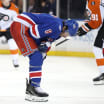The questions were never asked. They were never contemplated by Travis Roy's family the night of Oct. 20, 1995, when the freshman forward for Boston University lay motionless on the ice following a collision into the boards 11 seconds into his first collegiate shift on opening night against the University of North Dakota.
Travis Roy Foundation to close down, legacy will live on forever
Final charity hockey game April 7, prior to Rangers hosting Penguins at Madison Square Garden
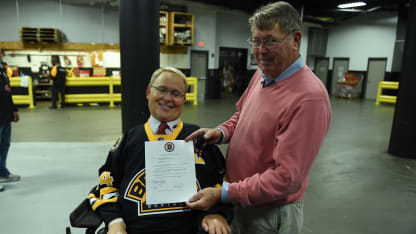
Questions like: Why did this have to happen? Why was the 18-year-old son of Lee and Brenda Roy paralyzed from the neck down?
"That's a negative," Lee said. "We never wanted to go down that road. It just wasn't what our family is."
The Roy family has always focused on getting back up. It was Lee's rule coaching Travis beginning at age 4, when the former forward at the University of Vermont from 1964-68 would tell him if you're down, get up. Travis couldn't get up after attempting to check North Dakota defenseman Mitch Vig, but he did get up to start The Travis Roy Foundation to help spinal cord injury survivors and fund research into a cure. Now his life's work until his death Oct. 29, 2020, at age 45, will cease to exist, per one of his last wishes.
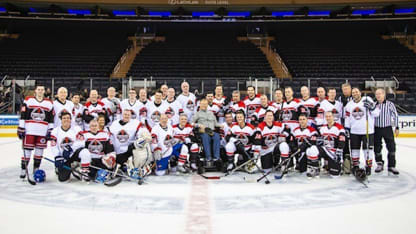
The seventh and final Travis Roy Foundation charity hockey game will be played Thursday at Madison Square Garden. Those who raised or donated a minimum of $3,000 will play for 90 minutes, have 30 minutes for a family and friends skate, and will watch from a suite when the New York Rangers play the Pittsburgh Penguins (7 p.m. ET; ESPN+, HULU, SNE, SNW, SNP, NHL LIVE).
"There's no question about it, tears will definitely be shed," said Scott Litner, organizer of the charity game.
Lee and foundation chairman Arthur Page will officiate the game after he and his wife Brenda are honored in a ceremony.
Eleven days later, 10 supporters will run the 2022 Boston Marathon on April 18, with a section traversing Commonwealth Avenue where Travis once lived.
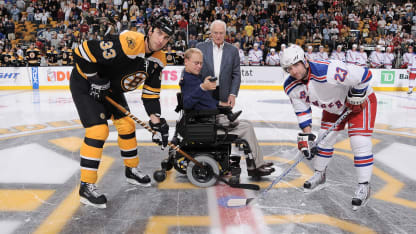
Buildings in Boston will be lit in BU red and white for the 2022 Boston WIFFLE Ball Challenge Tournament at Nickerson Field on the campus of Boston University on June 2 to benefit the Quality of Life Grant Program and Franciscan's Hospital for Children. Two teams will win a raffle to play wiffleball at Fenway Park courtesy of the Boston Red Sox, with donations expected to reach $1 million.
The Travis Roy Foundation may be ending, but plans are already in place for what cousin Brendan Collins calls "Travis' next shift." New events will aid research for spinal cord injuries and an annual gathering in Essex, Vermont, for the past 20 years was rebranded the Next Shift WIFFLE Ball tournament.
"Travis had a unique presence," Page said. "He focused on helping others. He was both selfless and powerful. The hockey and wiffleball events all brought out those qualities in others. Scott, Brendan and many others will try to keep those gifts alive. We all benefit."
----
Denna Laing is enjoying a second lease on life. She returned to suburban Boston last September after living 19 months at the University of Louisville for "The Big Idea," a trial research study funded in part with a $425,000 grant from the Travis Roy Foundation to the Christopher and Dana Reeve Foundation. An epidural stimulator was implanted with the goal of testing the effectiveness on people with spinal cord injuries like the one Laing sustained playing at the Outdoor Women's Classic for the Boston Pride at Gillette Stadium, home of the New England Patriots, on Dec. 31, 2015. The forward crashed into the boards, shattering her C5 vertebra in the front and C4, C5, and C6 in the back, leaving her with limited movement of her arms and no feeling in her legs.
Laing left Louisville, Kentucky, with movement in her legs and the ability to stand. The 30-year-old's rehab is ongoing at the Journey Forward therapy center in Canton, Massachusetts, with use of the stimulator connected wirelessly to software installed on a tablet or smartphone that allows users to select the activity they would like to do.
Roy was one of the first to reach out after Laing's accident. Though she said The Big Idea may not be a cure, it's been a big assist.
"He brought me back," Laing said. "Even in these past six years, I think that the technology is just really ramping up. I've been able to experience it and see it firsthand. Everything everyone did before me is the fire behind where we are today. It's going to keep improving and I hope that more people can get the stimulator because I honestly think it's the real deal. I don't think we're quite there yet if there's a finish line to this thing, but we are bounds ahead of where we were even a couple years ago."
----
Dr. Richard Litner was a general and pediatric surgeon on the medical staff for the Harvard University men's hockey team before a 2005 accident left him paralyzed. His son Scott was living in San Francisco, traveling to and from Boston for his father's rehab at Spaulding Rehabilitation Hospital, and moved to New York before Dr. Litner died May 22, 2006, at the age of 72.
Scott wanted to get involved with spinal cord research and the Travis Roy Foundation was recommended by former Harvard forward Andy Janfaza. Several years later, Litner asked Jordan Solomon, executive vice president of MSG Sports and a mutual alum at the University of Wisconsin, if there was a way to hold a foundation game on Garden ice.
Solomon agreed instantly. About $300,000 was raised within the first year.
"The foundation has touched so many lives over the years," Litner said. "Anyone that met him realizes that Travis was my hero. Despite the fact he got a pretty bad hand, he lived life to the fullest."
That dedication inspired many. Laing participated in the 2017 Boston Marathon with retired NHL forward Bobby Carpenter pushing her 26.2 miles in a racing wheelchair. She uses social media to show how the learning curve of spinal cord injuries is steep but if you see someone else doing it, you gain more confidence that you can do it.
"It's important to keep sharing your knowledge and your experience so other people can learn from your experiences and improve on them," Laing said. "Nowhere in Travis' mind was he ever thinking, 'Oh, I'm going to start a foundation.' It really shows the adaptability that he had and that someone can change what their goals are and what their future might look like, that things can still be OK, and you can still prosper in a different role. That was always important for me to see from Travis right off the bat. Even though you might have a different set of circumstances, you can always change those circumstances and do something beneficial."
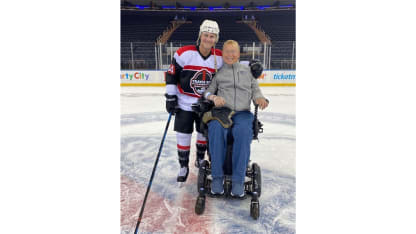
That was Travis Roy and his disarming smile, raised by parents grateful for endless support from an intimate hockey circle that included Rangers general manager Chris Drury, Travis' linemate at Boston University and on the ice for those 11 seconds.
On the surface, the Travis Roy Foundation is ending, but to Lee and Brenda, there will never be closure.
And that's a good thing.
"Connections continue to go on," Lee said. "It's not a bad thing at all. The hockey community, which is the first group that truly rallied around Travis, our family, continues to be there, as shown by showing what we're doing."
Visit the Travis Roy Foundation to help spinal cord injury survivors and their families live more independent and hopeful lives.
